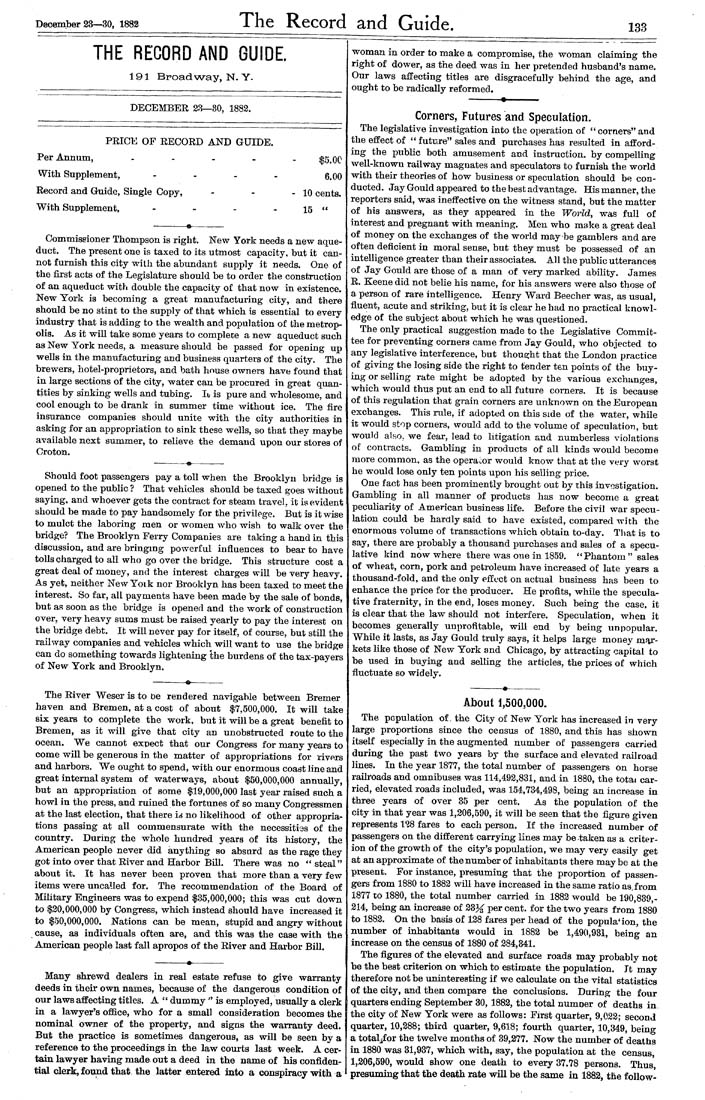Columbia University Libraries Digital Collections: The Real Estate Record
Use your browser's Print function to print these pages.
Real estate record and builders' guide: [v. 30, no. 771: Articles]: December 23-30, 1882

Text version:
Please note: this text may be incomplete. For more information about this OCR, view About OCR text.
December 23—30, 1883 The Record and Guide. 133 THE RECORD AND GUIDE. 191 Broad way, N. Y. DECEMBER 23—80, 1882. PRICE OF RECORD AND GUIDE. Per Annum, .... With Supplement, . . . . Record and Guide, Single Copy, With Supplement, - _ . , $5,0C 6.00 10 cents. 15 " Commissioner Thompson is right. New York needs a new aque¬ duct. The present one is taxed to its utmost capacity, but it can¬ not furnish this city with the abundant supply it needs. One of the first acts of the Legislature should be to order the construction of an aqueduct with double the capacity of that now in existence. New York is becoming a great manufacturing city, and there should be no stint to the supply of that which is essential to every industry that is adding to the wealth and population of the metrop¬ olis. As it will take some years to complete a new aqueduct such as New York needs, a measure should be passed for opening up wells in the manufacturing and business quarters of the city. The brewers, hotel-proprietors, and bath house owners have found that in large sections of the city, water can be procured in great quan¬ tities by sinking wells and tubing. It is pure and wholesome, and cool enough to be drank in summer time without ice. The fire insurance companies should unite with the city authorities in asking for an appropriation to sink these wells, so that they maybe available next summer, to relieve the demand upon our stores of Croton. Should foot passengers pay a toll when the Brooklyn bridge is opened to the public ? That vehicles should be taxed goes without saying, and whoever gets the contract for steam travel, it is evident should be made to pay handsomely for the privilege. But is it wise to mulct the laboring men or women who wish to walk over the bridge? The Brooklyn Ferry Companies are taking a hand ixi this discussion, and are bringmg powerful influences to bear to have tolls charged to all who go over the bridge. This structure cost a great deal of money, and the interest charges will be very heavy. As yet, neither New Yoik nor Brooklyn has been taxed to meet the interest. So far, all payments have been made by the sale of bonds, but as soon as the bridge is opened and the work of construction over, very heavy sums must be raised yearly to pay the interest on the bridge debt. It will never pay for itself, of course, but still the railway companies and vehicles which will want to use the bridge can do something towards lightening the burdens of the tax-payers of New York and Brooklyn. The River Weser is to be rendered navigable between Bremer haven and Bremen, at a cost of about $7,500,000. It will take six years to complete the work, but it will be a great benefit to Bremen, as it will give that city an unobstructed route to the ocean. We cannot expect that our Congress for many years to come will be generous in the matter of appropriations for rivers and harbors. We ought to spend, with our enormous coast line and great internal system of waterways, about $50,000,000 annually, but an appropriation of some $19,000,000 last year raised such a howl in the press, and ruined the fortunes of so many Congressmen at the last election, that there i